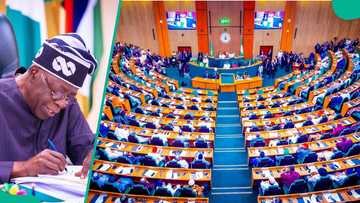Key Changes as Tinubu Finally Signs 4 Tax Reform Bills into Law, Analysts Explain Benefits
- President Bola Tinubu has officially inked the Tax Reform Bills into law, a significant shift in Nigeria’s tax administration
- The move follows months of policy work, reviews, and consultations aimed at modernising a tax system long criticised as complex and unfair
- The new laws include the Nigeria Tax Bill, Nigeria Tax Administration Bill, Nigeria Revenue Service Bill, and the Joint Revenue Board Bill
Legit.ng’s Pascal Oparada has reported on tech, energy, stocks, investment and the economy for over a decade.
President Bola Ahmed Tinubu has officially signed into law four landmark Tax Reform Bills, marking a significant shift in Nigeria’s tax landscape.
The move follows months of policy work, reviews, and consultations aimed at modernising a tax system long criticised as complex, unfair, and burdensome for small businesses.

Source: Facebook
4 new tax laws signed by Tinubu
The new laws include the Nigeria Tax Bill, Nigeria Tax Administration Bill, Nigeria Revenue Service (Establishment) Bill, and the Joint Revenue Board (Establishment) Bill.
Together, they aim to streamline tax collection, enhance transparency, promote equity among states, and protect taxpayers’ rights.
“This is not just another item checked off a list,” said columnist Arabinrin Aderonke Atoyebi in a strongly worded opinion. “It is one of the most transformative economic decisions Nigeria has seen in years.”
The Nigerian Tax Bill consolidates existing tax laws into a single, more user-friendly framework. Meanwhile, the Administration Bill introduces standardised, digital collection processes to ease compliance for citizens and businesses.
Under the reforms, the Federal Inland Revenue Service (FIRS) has been replaced by a more independent body—the Nigeria Revenue Service—with a broader mandate covering both tax and non-tax revenues.
Key highlights of new tax laws
A key highlight is the restructuring of Value Added Tax (VAT) sharing. For the first time, states will retain 30% of the VAT they generate. Another 50% will be shared equally among all states, and the final 20% distributed based on population.
Analysts say this change incentivises states to improve their local economies and tax collection efficiency.
The reforms also grant exemptions to small businesses earning below ₦50 million annually from paying company income tax, a measure expected to benefit thousands of micro and small enterprises across the country.
“These laws speak the language people understand,” Atoyebi said. “They offer relief from the constant anxiety of multiple levies, unclear charges, and unpredictable policies.”
FIRS chairman explains new law
The legislation introduces oversight mechanisms such as a Tax Appeal Tribunal and Tax Ombudsman, aiming to strengthen accountability and fairness in the tax system.
Praise was extended to Dr Zacch Adedeji, executive chairman of the FIRS, who played a central role in the reform process.
Atoyebi wrote, “He put his head down, did the work, and it’s showing now.”

Source: Getty Images
The reforms are seen as part of the Tinubu administration’s broader “Renewed Hope” agenda, with the potential to rebuild public trust in government and improve Nigeria’s economic outlook.
FG takes action to increase revenue
Legit.ng earlier reported that President Bola Tinubu had presented the four tax reform bills to the National Assembly for consideration.
The bills included the Nigeria Tax Bill (Ease of Doing Business), the Nigeria Tax Administration Bill, the Nigeria Revenue Service (Establishment) Bill, and the Joint Revenue Board (Establishment) Bill.
The bills were structured to completely revamp Nigeria’s tax system, replacing the current practice that has been in place since the military administrations.
Proofreading by Kola Muhammed, copy editor at Legit.ng.
Source: Legit.ng





